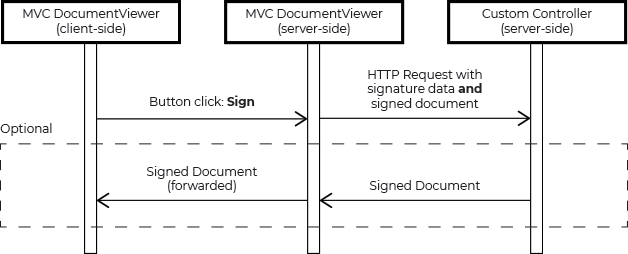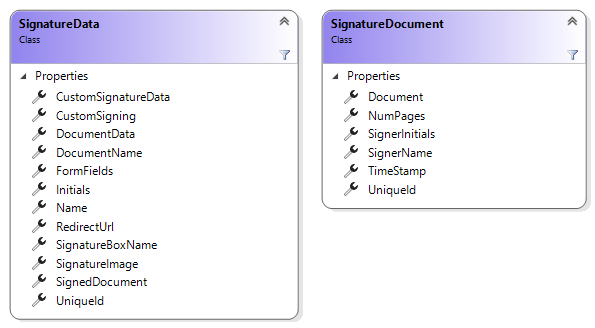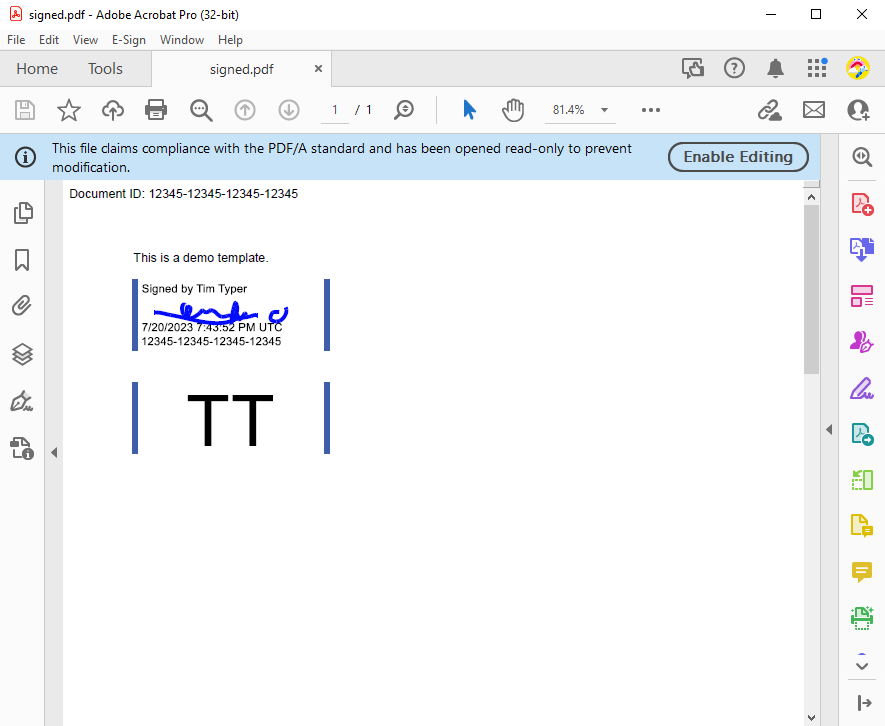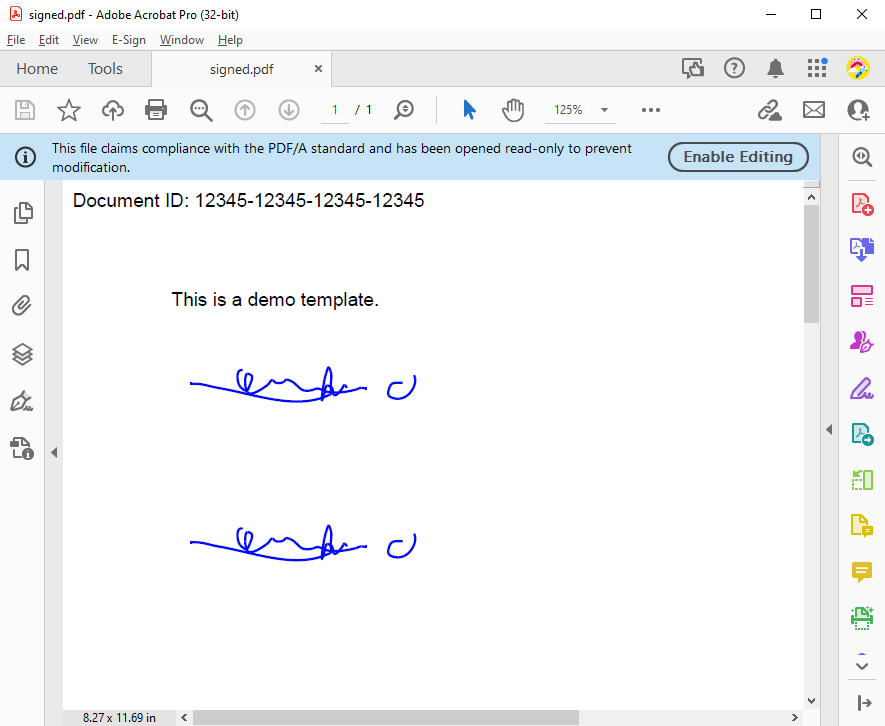Common Web API Methods for Handling E-Signature Workflows in ASP.NET Core C#
Capturing electronic signatures and signing signature fields with certificates is a common feature of the TX Text Control Document Viewer. The most common server-side Web API methods for handling electronic signatures are described in this article.

In addition to the standard Document Viewer signing process, which merges the signature image and returns the document, custom Web API calls can be used to handle custom requests. The RedirectUrlAfterSignature property can be used to provide an endpoint that is used to forward the signature data and the signed document.
The following MVC Razor code shows how to set the RedirectUrlAfterSignature property to pass the signature data to the HandleSignature controller method.
@using TXTextControl.Web.MVC.DocumentViewer
@Html.TXTextControl().DocumentViewer(settings => {
settings.DocumentPath = "App_Data\\template.tx";
settings.SignatureSettings = new SignatureSettings() {
ShowSignatureBar = true,
OwnerName = "Josh Jackson",
SignerName = "Tim Typer",
SignerInitials = "TT",
UniqueId = "12345-12345-12345-12345",
RedirectUrlAfterSignature = this.Url.Action(
"HandleSignature",
"Signature",
null,
Context.Request.Scheme,
null),
SignatureBoxes = new SignatureBox[] {
new SignatureBox("txsign") { SigningRequired = true, Style = SignatureBox.SignatureBoxStyle.Signature },
new SignatureBox("txsigninit") { SigningRequired = true, Style = SignatureBox.SignatureBoxStyle.Initials }
}};
}).Render()Custom Signing Process
After the user signs the document, the electronic signature is attached to the document and forwarded to the specified URL, along with the signature data such as the signature image and timestamp information.

To handle the signature data, a custom HttpPost method must be implemented.
[HttpPost]
public string HandleSignature(
[FromBody] TXTextControl.Web.MVC.DocumentViewer.Models.SignatureData data)
{
var test = data.SignedDocument.Document; // signed document
// ...
return "";
}SignatureData Object
The Document Viewer calls this endpoint and passes an object of type SignatureData in the payload.

This SignatureData object can be used to process the signed document in a custom process without sending the document back from the client side for further processing.
Signing Signature Fields
The following HttpPost method loads the signed document and applies a certificate to all signature fields by looping through the Signature
[HttpPost]
public IActionResult HandleSignature([FromBody] SignatureData data) {
byte[] bPDF;
// create temporary ServerTextControl
using (TXTextControl.ServerTextControl tx = new TXTextControl.ServerTextControl()) {
tx.Create();
// load the document
tx.Load(Convert.FromBase64String(data.SignedDocument.Document),
TXTextControl.BinaryStreamType.InternalUnicodeFormat);
X509Certificate2 cert = new X509Certificate2("App_Data/textcontrolself.pfx", "123");
var signatureFields = new List<DigitalSignature>();
foreach (SignatureBox box in data.SignatureBoxes) {
signatureFields.Add(new DigitalSignature(cert, null, box.Name));
}
TXTextControl.SaveSettings saveSettings = new TXTextControl.SaveSettings() {
CreatorApplication = "Your Application",
SignatureFields = signatureFields.ToArray()
};
// store the PDF in the database or send it to the client
tx.Save(out bPDF, TXTextControl.BinaryStreamType.AdobePDFA, saveSettings);
// alternatively, save the PDF to a file
tx.Save("App_Data/signed.pdf", TXTextControl.StreamType.AdobePDFA, saveSettings);
}
// return any value to the client
return Ok();
}The result of this implementation is that all signature fields are digitally signed. The signature field image is the default image created by the Document Viewer.

Flatten Form Fields
If the document contains form fields, you may want to flatten the form fields and convert the selected values to text in the final PDF document. Before exporting to PDF using the Save method, the following helper function can be called in the above code.
private void FlattenFormFields(ServerTextControl textControl) {
int fieldCount = textControl.FormFields.Count;
for (int i = 0; i < fieldCount; i++) {
TextFieldCollectionBase.TextFieldEnumerator fieldEnum =
textControl.FormFields.GetEnumerator();
fieldEnum.MoveNext();
FormField curField = (FormField)fieldEnum.Current;
textControl.FormFields.Remove(curField, true);
}
}Custom Signature Stamps
The following code uses the signature image captured by the Document Viewer. It uses this image only as the signature stamp.
[HttpPost]
public IActionResult CustomSignature([FromBody] SignatureData data) {
byte[] bPDF;
// create temporary ServerTextControl
using (TXTextControl.ServerTextControl tx = new TXTextControl.ServerTextControl()) {
tx.Create();
// load the document
tx.Load(Convert.FromBase64String(data.SignedDocument.Document), TXTextControl.BinaryStreamType.InternalUnicodeFormat);
var signatureImage = System.Text.Encoding.UTF8.GetString(
Convert.FromBase64String(data.SignatureImage));
var stamp = Encoding.ASCII.GetBytes(signatureImage);
// create a memory stream from SVG
using (MemoryStream ms = new MemoryStream(
stamp, 0, stamp.Length, writable: false, publiclyVisible: true)) {
foreach (SignatureField field in tx.SignatureFields) {
field.Image = new SignatureImage(ms);
}
}
X509Certificate2 cert = new X509Certificate2("App_Data/textcontrolself.pfx", "123");
var signatureFields = new List<DigitalSignature>();
foreach (SignatureBox box in data.SignatureBoxes) {
signatureFields.Add(new DigitalSignature(cert, null, box.Name));
}
TXTextControl.SaveSettings saveSettings = new TXTextControl.SaveSettings() {
CreatorApplication = "Your Application",
SignatureFields = signatureFields.ToArray()
};
// store the PDF in the database or send it to the client
tx.Save(out bPDF, TXTextControl.BinaryStreamType.AdobePDFA, saveSettings);
// alternatively, save the PDF to a file
tx.Save("App_Data/signed.pdf", TXTextControl.StreamType.AdobePDFA, saveSettings);
}
// return any value to the client
return Ok();
}All of the signature fields will be merged with the captured signature image only, without the default signature stamp.

From our GitHub repository, you can download the sample project that contains the controller methods for your own tests.
![]()
Download and Fork This Sample on GitHub
We proudly host our sample code on github.com/TextControl.
Please fork and contribute.
Requirements for this sample
- TX Text Control .NET Server
- Visual Studio 2022
ASP.NET
Integrate document processing into your applications to create documents such as PDFs and MS Word documents, including client-side document editing, viewing, and electronic signatures.
- Angular
- Blazor
- React
- JavaScript
- ASP.NET MVC, ASP.NET Core, and WebForms
Related Posts
ASP.NETASP.NET CoreDocument Viewer
Securing the Signature Endpoint with Custom ActionFilterAttributes
The HttpPost endpoint to which the signed document is forwarded can be in the same application or a completely different application. This tutorial will show you how to secure this endpoint…
ASP.NETASP.NET CoreDocument Viewer
High-Performance Text Replacement in Large DOCX Files using C# .NET
Learn how to efficiently replace text in large DOCX files using C# .NET and the ServerTextControl component from Text Control. This article demonstrates the performance benefits of using the…
ASP.NETASP.NET CoreDocument Viewer
Document Viewer 33.2.1 Released: New Event and Bug Fixes
This service pack includes important bug fixes and improvements to enhance the stability and performance of the Document Viewer. In addition, a new event has been introduced to provide developers…
Building an ASP.NET Core Backend (Linux and Windows) for the Document Editor…
This article shows how to create a backend for the Document Editor and Viewer using ASP.NET Core. The backend can be hosted on Windows and Linux and can be used in Blazor, Angular, JavaScript, and…
TX Text Control Document Editor and Viewer for Blazor Released
We are very happy to announce the immediate availability of TX Text Control packages for Blazor. This article gives an overview of the available packages and how to use them.






